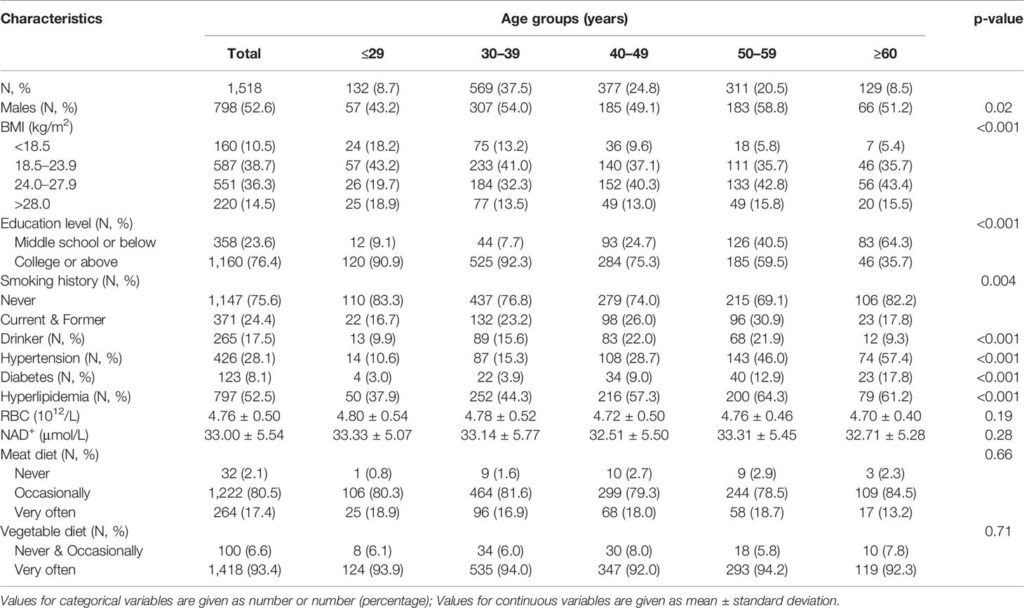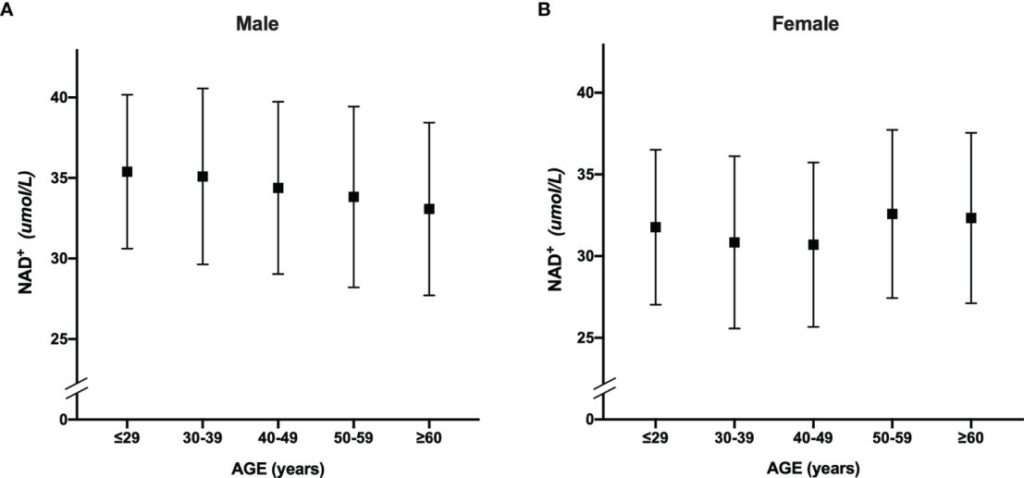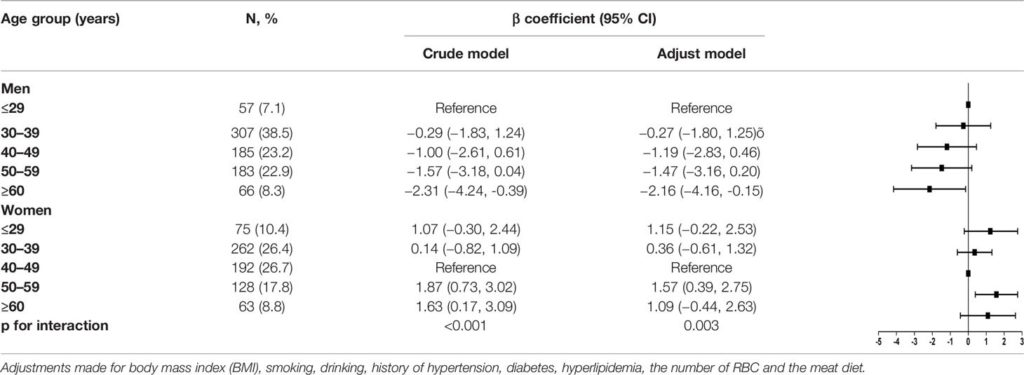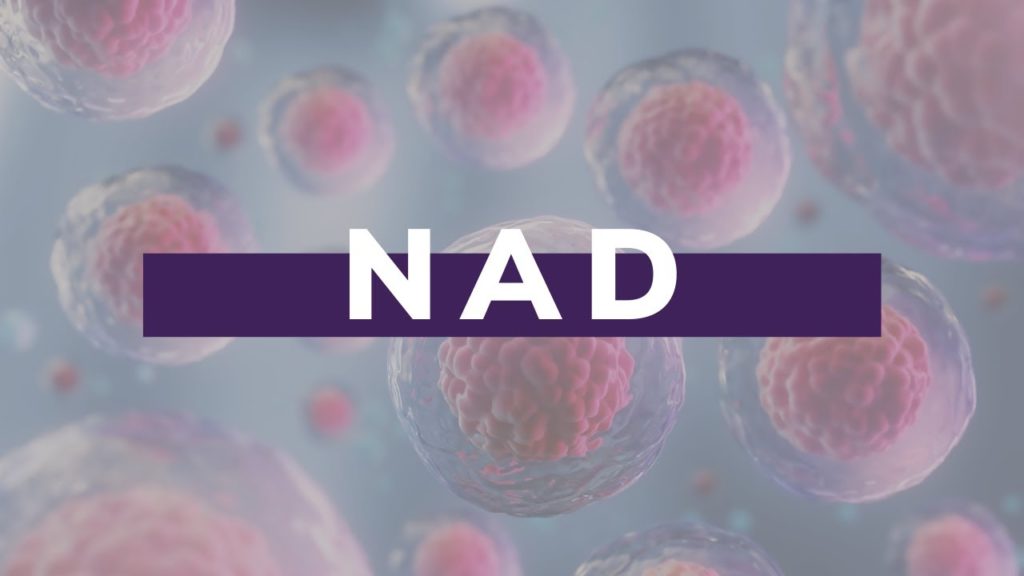Nicotinamide adenine dinucleotide, or NAD, is found in all body cells and plays a vital role in the body’s metabolism. It is an essential compound required for critical and cellular functions. NAD+ is the most abundant compound in the body. As we age, our NAD+ levels start to decline, which leads to age-related conditions and diseases. Many proteins use NAD+ throughout the body, such as sirtuins, which repair damaged DNA. It has many beneficial properties for the body, especially for healthy slowing down aging. NAD+ is synthesized through five precursors: Nicotinamide Riboside (NR), Nicotinic Acid (NA), Nicotinamide (Nam), Nicotinamide Mononucleotide (NMN), and Tryptophan (Trp).
Importance of NAD+
NAD+ has a particular role in metabolic processes, such as glycolysis, the Krebs Cycle, and the electron transport chain, which occurs in the mitochondria and thus provides cellular energy. As a ligand, NAD+ binds to enzymes and transfers electrons between molecules. Electrons are the atomic basis for cellular energy, and by transferring from one molecule to another, NAD+ acts through a cellular mechanism similar to charging a battery. The battery discharges when electrons are used up to provide energy. These electrons cannot return to their starting point without amplification. In cells, NAD+ serves as a booster. In this way, NAD+ can decrease or increase enzyme activity, gene expression, and cell signaling.
In metabolism, NAD+ occurs in oxidation-reduction reactions, transferring electrons from one response to another. It is found in two forms in cells, NAD+ as an oxidizing agent and NADH as a reducing agent. In addition, NAD+ helps repair DNA damage. As organisms age, they experience DNA damage due to environmental factors such as radiation, pollution, and inaccurate DNA replication. According to the studies, the accumulation of DNA damage is the leading cause of aging. In addition to that, NAD+ has the potential to control and repair DNA. Therefore, excessive DNA damage can deplete valuable cellular resources.
The findings analysis
This study is focused on investigating the relationship between the whole blood NAD+ levels and the aging process.
In this study, 1518 participants over 18 years old were included with no cardiovascular and cancer history. A questionnaire obtained all relevant factor that affects this study. These participants have medical conditions (hypertension, hyperlipidemia, Diabetes Mellitus, etc.), lifestyle (alcohol consumption, smoking, and body mass index), and diet (veggies, fruit, and meat). The red blood levels were also measured because they can impact the NAD+ measurements results. After overnight fasting, the testing for whole blood NAD+ levels was obtained through blood samples. The participants were divided into several groups according to their age by ten years, including ≤29, 30–39, 40–49, 50–59, and ≥60 years.
The results vary in BMI, gender, drinking, and smoking history in five age groups. Also, the results were different in the history of diabetes, hypertension, and hyperlipidemia. On the other hand, there was no specific difference in all participants in the five groups in the NAD+ level measurements. However, the average whole blood amount of NAD+ was 33.0 ± 5.5 μmol/L in the participants. Furthermore, no difference was obtained in the vegetable diet, but there were differences in the meat diet groups.

(Basic characteristics from participants)
Another interesting point is that the whole blood NAD+ levels differ in females and males. The NAD+ levels were significantly higher in men and gradually decreased with aging, while in women, there were variations presented in the picture below.

(The difference between whole blood NAD+ levels in males and females)
Analyses by gender were also taken. There was a significant association between whole blood NAD+ levels and aging in men, especially after 60 years old. In women, after the age of 50, there was no relationship between NAD+ levels and aging, showed in the picture below.

(The different relationship between whole blood NAD+ levels and aging in men and women.)
Limitations in the study
This study has several limitations. Firstly, this study is only focused on the relationship between whole blood NAD+ levels and aging, with no time-related association between these two. Second, in the study, only participants over 18 took place, so there is no record to compare newborns, children, and teens. Another limit is that all these findings are done only according to the whole blood NAD+ levels, so we can’t know the relationship in other tissues and organs between NAD+ and aging. Furthermore, the NAD+ boosters like NMN, NA, and NR would tell more about the NAD+ levels in the body, but in this study, they were excluded.
Conclusion
In this finding, several things were observed. For example, the relation between NAD+ blood concentration and aging in both males and females, the results obtained from the fasting, the impact of the female menopause after 50 years, and more.
We can conclude that the association between NAD+ and aging differs in men and women. In middle-aged men, the loss of whole blood NAD+ and aging were observed, while in women, no differences were seen. Therefore, further investigations are needed to notice the relationship of NAD+ with aging in children and teens. Also, for future studies, gender differentiation should be considered, and the mechanism of NAD+ homeostasis.
References
- Yang, F., Deng, X., Yu, Y., Luo, L., Chen, X., Zheng, J., Qiu, Y., Xiao, F., Xie, X., Zhao, Y., Guo, J., Hu, F., Zhang, X., Ju, Z., & Zhou, Y. (2022). Association of Human Whole Blood NAD+ Contents With Aging. In Frontiers in Endocrinology (Vol. 13). Frontiers Media SA. https://doi.org/10.3389/fendo.2022.829658



